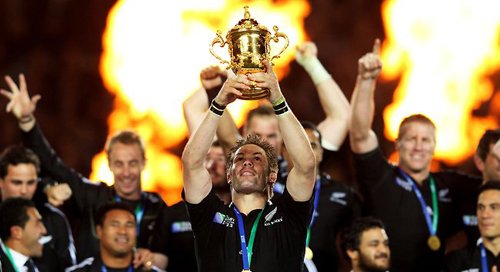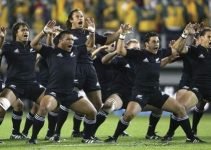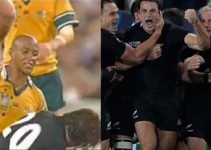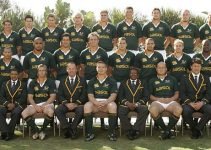The New Zealand All Blacks have won the 2011 Rugby World Cup, triumphing in a gripping but low scoring final against France 8 to 7. The match up mirrored the inaugural 1987 Rugby World Cup final, also played at Auckland’s Eden Park. Interestingly, the bronze final match up was the same as the 1987 version, but this time Australia emerged victorious. Apart from the rematch, the 2011 final will be remembered as being far different to the 1987 final which New Zealand ran away with 29 to 9. We will never know what might have happened had Piri Weepu, apparently carrying an injury from the warm up and probably feeling the heart of the occasion, hadn’t left eight points on the kicking tee. Most likely France would have still bounced back. It was clear from the ‘Mighty Ducks’ flying V advancing Haka challenge that they came to play. France advanced towards New Zealand beyond the 10 metre line, earning them the ire of the IRB, who have issued an edict that teams must not advance while the Haka is being performed. Hopefully this is not the case, as the All Blacks would attest that the Haka is a challenge that should be met, not enveloped by increased political correctness.

After an agonising 24 year wait, the New Zealand All Blacks now join fellow time-time champions Australia Wallabies and South Africa Springboks as having won the most World Cups. France have now played in three Rugby World Cup finals, without a victory.
In the end the only All Black scores were from unlikely sources. Loosehead prop Tony Woodcock rumbled over the line after a poetry-in-motion set piece move from a lineout to score his first try against anyone other than Australia. Man-of-the-moment Stephen Donald stepped up from whitebaiting on the Waikato River via the All Black bench to kick a vital penalty in the second half. France capitalised on a brain explosion by Piri Weepu when his panicked kick pass went wrong and Thierry Dusautoir eventually scored a converted try next to the posts.
While the All Blacks have been universally congratulated and applauded for their win, the credit is largely coming in recognition of their form in the preceding four years, with the victory being fitting reward for that. The game itself has seen France emerge as unlucky losers in the eyes of many.
The subsequent criticism of the All Black win and cheer leading for the ‘hard done by’ French is another classic example of the All Blacks being judged by different criteria than the rest of the world. When rugby media and fans say that France played the better rugby in the final, or even saying France deserved to win, what criteria are they basing that on? Surely it is based on France form prior to the match rather than the match itself. All France did was lift to an equal footing as the All Blacks on Saturday, and such was the difference between that and anything France had shown this year that the implication is that France should have one. Any country would be pressured and shaken by that feisty performance by France, and if it was anyone but the All Blacks they would be lauded for holding out for the win.
If New Zealand looked more disjointed than they had previously, perhaps it is also because they were down to their fourth pivot. Indeed, the man who played in the pivotal fly half for 50 minutes of the final had not played for the team in 11 months, had only been with the team for two weeks and hadn’t played a game of rugby for almost two months. Again, any other team would be lauded for triumphing under such adversity. There is also the small matter of the All Blacks losing their 100 test fullback in the last game of pool play and their captain Richie McCaw carrying a foot injury for most of the season that has stopped him training for most of the World Cup.
It certainly isn’t the statistics that showed France was the better team. The All Blacks made 121 tackles and missed 13. France made 129 tackles and missed 16. Both teams lost two of their own lineouts. The inspirational captains featured heavily in the tackle stats, Richie McCaw making 15 and IRB 2011 Player of the Year Thierry Dusautoir making 16. Tellingly, the All Blacks turned the ball over 13 times compared to France turning it over 18 times. Yet, here is another opportunity critics are taking to not give the All Blacks their due, with referee Craig Joubert getting called the All Blacks’ 16th man. However, there were numerous times when the All Blacks should have won a turnover, only for Joubert to award possession back to France; enough to say that both teams had their unlucky calls.
Some are even putting the All Black’s win solely down to the vocal and parochial New Zealand crowd. Such accusations show little understanding of the intense goldfish bowl the All Blacks have lived in the last two months, and the pressure that comes with that. Secondly, all power to teams that make the most of home ground advantage. It’s called advantage for a reason, and France should have been able to benefit from that in the 2007 Rugby World Cup.
Much is made of the All Blacks’ form in knock out rugby, but no one ever denies that it is the opposing team that plays the game of their life in those matches. Such is the toll of lifting to defeat the All Blacks in a knock out match that no one has ever gone onto win the next match, let alone the tournament. How about focusing on why teams don’t play at that level between World Cups? If anything the All Blacks should be lauded for keeping the standard high between World Cups unlike other countries who simply lift for one knock out game every four years.
Full credit to France for making the 2011 Rugby World Cup the most gripping game of rugby in recent memory, but judge them on the same criteria as New Zealand and give the All Blacks the credit they deserve.



